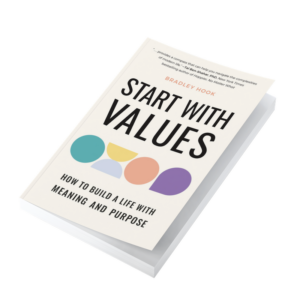
Our Founder

Writer, speaker, and entrepreneur Bradley Hook established The Values Institute as a way to lay the groundwork for his book Start With Values (Penguin Random House).
However, the Values Institute is more than a companion to a book; it’s a living, evolving initiative that aspires to be the world’s premier content repository and digital platform for core values.
Find out more about Brad Hook.
Our Values
We operate under three guiding values: Innovation, Kindness, and Well-being. These values inform every piece of research, article, and tool we share with our community.
Ready to build a meaningful life?
Click the links below to order your copy of Start With Values.👇
Our Vision
We envision a world where values are at the heart of every decision—transforming lives, workplaces, and communities into places of connection, growth, and shared meaning.
What We Do
The Values Institute offers tools, training, and resources to help you:
- Discover Your Core Values: Through our innovative assessments, you’ll uncover the values that truly define you or your organization.
- Align Actions with Intentions: Learn how to bridge the gap between what you believe and how you live or work.
- Activate Resilience and Purpose: Build systems and habits that make your values actionable in everyday life.
We are also deeply committed to Artificial Intelligence values, designing innovative frameworks for AI Ethics to ensure that machines and humans will coexist peacefully, centered around universal core values of human flourishing, integrity, and sustainability. Read more about values-based AI Ethics.
Join the Movement
Whether you’re seeking personal growth, organizational alignment, or a way to contribute to a more values-driven world, the Values Institute is here to support you. Explore our courses, assessments, and community to start your journey.
Meet our network of contributors.
What Sets Us Apart
The Values Institute stands out for its multidisciplinary approach. We merge insights from neuroscience, philosophy, psychology, evolutionary biology, and more to offer a comprehensive framework for personal and collective flourishing. By integrating these diverse fields, we present a modern, updated framework for understanding and implementing core values in daily life.
Why Core Values?
Why do core values matter? They serve as a personal compass for success, a metric for well-being, and a framework for spiritual development. By regularly affirming your core values, you not only cope better with stress but also turn even the most mundane tasks into deeply fulfilling experiences.
Participants who affirmed their values had significantly lower cortisol responses to stress, compared with control participants.
Affirmation of Personal Values Buffers Neuroendocrine and Psychological Stress Responses. University of California.
Much has been written about “stress management” techniques that are primarily behavioral in nature — such as getting adequate sleep, regular exercise, and mental downtime; taking vacation; doing controlled breathing; practicing yoga or mindfulness meditation; or getting acupuncture treatments. But relatively little has been written recently on the benefits of self-disciplined articulation of a philosophical worldview and core values that help us weather the storms and devastations that inevitably rock our lives and careers.
David Brendel, MD, PhD, Harvard Business Review
It turns out that writing about your values is one of the most effective psychological interventions ever studied. In the short term, writing about personal values makes people feel more powerful, in control, proud, and strong. It also makes them feel more loving, connected, and empathetic toward others. It increases pain tolerance, enhances self-control, and reduces unhelpful rumination after a stressful experience.
In the long term, writing about values has been shown to boost GPAs, reduce doctor visits, improve mental health, and help with everything from weight loss to quitting smoking and reducing drinking. It helps people persevere in the face of discrimination and reduces self-handicapping. In many cases, these benefits are a result of a one-time mindset intervention. People who write about their values once, for ten minutes, show benefits months or even years later.
Professor Kelly McGonigal, Stanford University

